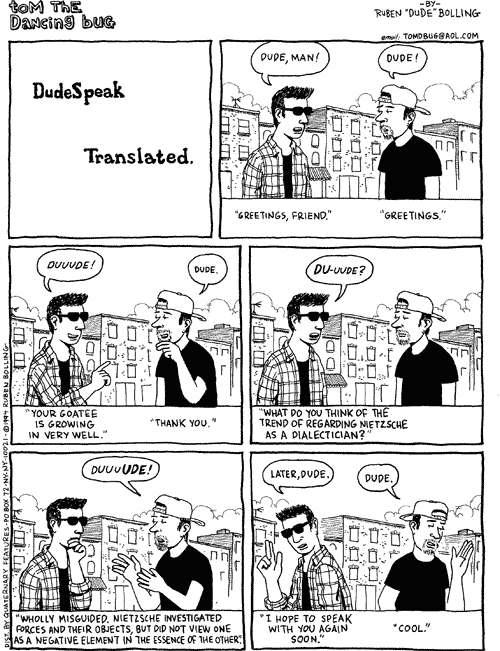December 10, 2004
Duding out
My mailbox contains evidence of growing interest in the expressive possibilities of the word dude, and growing puzzlement in the face of this interest. One example of each follows.
David Wald sent a pointer to Ruben Bolling's meditation on "DudeSpeak Translated":
This shows that cartoons are subject to a sort of variant of the second law of thermodynamics: in all isolated cultural exchanges, irony increases.
John McCall wrote
I must confess a little confusion over the Log's recent "dude" activity; the complexity must escape me. Grammatically, it's a token of address like any other: these all-dude conversations could easily have used any other form of address, and the only superficial surprise here arises because both speakers are using the same form. Imagine, for example, two speakers, John and Martha, holding exactly the BASEketball conversation, but each saying the other's name in place of "dude" -- even if it doesn't seem fully natural (for reasons I'll describe), it's just as sensible as the original (which is to say, very).
Semantically, it acts just as you describe (i.e. hip, informal), except it's stripped of some of the baggage of other forms of address. For example, the John/Martha substitution seems a little unnatural: normally, we only address people by their names when we're specifically calling for their attention. "dude" doesn't have this quality, probably because it isn't as obvious of a reference to a specific person; that may explain its popularity, since English doesn't have many similarly unloaded forms of address (occupational titles being awkward and "milord" and "milady" normally being inappropriate).
And I might as well throw in how much I appreciate the blog; it is one of the most consistent forms of amusement in my internet-reading life, and I'm grateful for all the work you and the others put into it. Thank you very much; I hope you continue the effort for as long as you still enjoy it.
Let me try to put this another way. The same word(s) can always be used with a range of different (illocutionary and perlocutionary) meanings, which may be encoded to a limited extent in prosody and voice quality and so on, but mostly arise just from the normal dynamics of communication. This makes it easy to have conversational sequences in which the same word is used to mean a sequence of different things. The repeated word doesn't have to be slang, or a greeting, or anything else in particular. For example:
A: When should we do it?
B: January? = [how about January?]
A: January!?! = [how can you suggest that? It's just a month away, and you know what the start of the semester is like]
B: January. = [Yes, I know, but the alternatives are worse, and we can do it.]
A: January... = [Hmm, you're seriously suggesting January, aren't you...]
B: January! = [Yes, you dope, let's decide this and move on]
and so on.
People seem to be especially fond of these single-word conversations with newly-discovered slang like dude. One reason for this was featured in Scott Kiesling's American Speech article -- such jokes fit the always-popular view that youth culture has degenerated to a linguistic level barely above grunts and squeals. I think there's another side to it as well, seen from the other side of the fence: incoming slang is a sort of secret language, expressing exquisitely shaded meanings that are shared among the in-group but are baffling to outsiders. But what the outsiders are missing is not so much the lexical items as the shared cultural context, and so it's not so easy as learning a word definition. The all-dude cartoons are a way of making that point, and I suspect that's why natives of dudespeak seem to like them even more than the members of pre-dude generations do.
On the other hand, it's perfectly reasonable for John McCall to be puzzled by the general fascination with this topic. Dude gustibus non est disputandum.
Posted by Mark Liberman at December 10, 2004 07:57 AM
